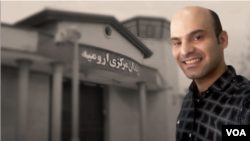The family of a jailed Iranian dissident recently sentenced to 14 years in prison for peaceful activism has begun speaking out about his case, saying his health is worsening as Iranian officials deny him treatment for severe epilepsy after forcing him to confess to security crimes.
In a Thursday Skype video interview with VOA Persian from her home in Iran’s northwestern city of Urmia, Hanieh Gharehoghlani said the health of her 34-year-old activist brother Hamed has worsened in the city’s central prison where he has been detained since July. Intelligence agents had arrested Hamed, a member of Iran’s Azerbaijani Turk ethnic minority, on June 27 and interrogated him for two weeks before transferring him to the prison, according to London-based rights group Amnesty International.
Since then, Iranian authorities have denied Hamed the medical treatment that he needs for a severe form of epilepsy, a neurological disorder, that causes grand mal or tonic-clonic seizures, his sister said. Tonic-clonic seizures are described by the Mayo Clinic, a U.S. medical research center, as the most dramatic type of epileptic seizure and can cause an abrupt loss of consciousness, body stiffening and shaking, and sometimes loss of bladder control or biting your tongue.
Hanieh Gharehoghlani said her brother's condition requires him to have a monthly examination from a specialist doctor and a neurological examination every six months, but authorities have barred him from getting such treatment at a hospital outside of prison. She said the Urmia prison’s doctor also has refused to see Hamed due to an apparent lack of specialized knowledge of the inmate’s condition, while a psychiatrist who did have one session with Hamed asked him about his political beliefs rather than assessing his emotional state.
Hamed's sister said Iranian authorities also have refused to let him receive medication prescribed by his doctor and brought to the prison by family members.
Amnesty International sent an appeal earlier this month to its supporters to write to Iran’s judiciary chief to urge him to free Hamed Gharehoghlani and, pending such a release, to ensure he is provided with immediate and continued access to medication and external health care.
Hanieh Gharehoghlani told VOA that interrogators forced her brother to confess to security crimes by warning him that she would be arrested and their mother would be killed if he did not comply. She said intelligence agents also had summoned her and her mother after Hamed’s arrest and had pressured them to stay silent about his case by making them sign statements promising not to “insult” Iranian Supreme Leader Ayatollah Ali Khamenei or “Islamic sanctities.”
Gharehoghlani broke her silence about the case last week by speaking to VOA and Britain-based TV network Iran International.
VOA is unable to independently verify the circumstances of Hamed Gharehoghlani’s detention or his family’s interactions with Iranian authorities because it is barred from reporting inside Iran.
There has been no reporting about his case in Iranian state media in recent months.
Appeal to free Gharehoghlani
In its message to supporters, Amnesty International said Hamed Gharehoghlani was given a “grossly unfair” trial that lasted 10 minutes on September 28 after having had only one chance to meet his lawyer in prison while in the presence of intelligence agents. It said authorities only gave him a few minutes to glance at the verdict on November 29 before asking him to sign a statement acknowledging notification of his sentence.
The rights group said a Revolutionary Court in Urmia convicted Gharehoghlani of “insulting the Supreme Leader”, “spreading propaganda against the system”, and “membership in a group that engages in armed insurrection against the Islamic Republic system” and sentenced him to 14 years and one month in prison. It said he appealed the verdict on January 24.
Amnesty International said Gharehoghlani was convicted in connection with his online posts that accused Khamenei of corruption and his online exchanges with individuals whom Iranian authorities said were supporters of exiled opposition group People's Mujahedeen of Iran (MEK) and whom allegedly “incited” him to tear up banners with images of Khamenei and top Iranian military commander Qassem Soleimani, killed in a U.S. drone strike in Iraq in January 2020.
In her VOA interview, Hanieh Gharehoghlani said her brother is not an MEK sympathizer.
Amnesty International said it was concerned that Hamed was punished with a long sentence due to the current association of two of his exiled relatives with the MEK.
The U.S. repeatedly denounced Iran’s harsh treatment of political prisoners and its violent crackdowns on peaceful anti-government protesters in recent years under the former administration of President Donald Trump who left office last month. Since his successor Joe Biden’s January 20 inauguration, U.S. officials have not commented on Iran’s poor human rights record.
This article originated in VOA’s Persian Service. Click here for the original Persian version of the story.




